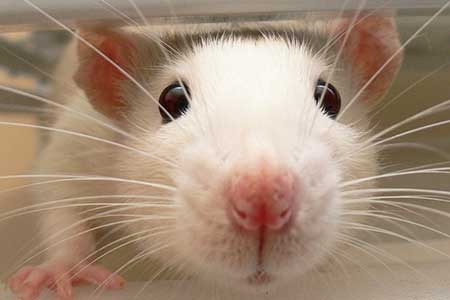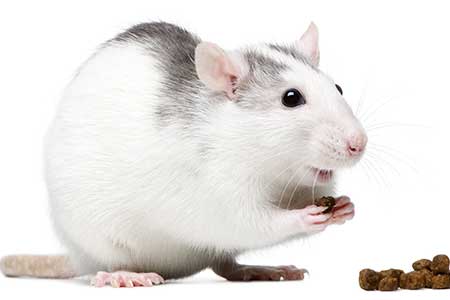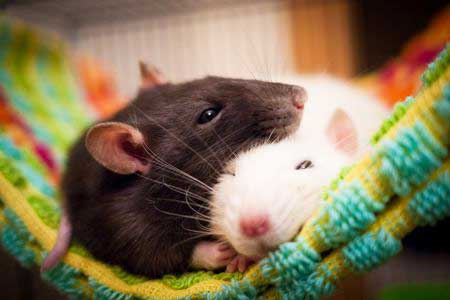Rat Care Guide
Caring for your pet rat
Rats make fantastic little pets as they are intelligent and inquisitive little creatures. To fully understand what is required to care for your pet rat read the following helpful guide.
Future Owner List:
- A cage with multiple levels
- A rat house to go in the cage for sleep time
- Food bowl
- Drink bottle
- Rat specific food
- Bedding for the base of the cage (we recommend Critter Crumble- great for odour control)
- Tunnel and/or other interactive toy for stimulation
- Wood chew
- Salt lick
- Plenty of love and play time to enjoy this intelligent little animal

Why pet rats make fantastic pets!
Rats make ideal pets for numerous reasons - they are intelligent, social and will charm you to create a very lovable addition to your family. They are also one of the cheapest and most low maintenance pets you can have as well only occupying a small area of your household. Being intelligent means they are extremely trainable and are known for many performing tricks (YouTube has some great examples of rats performing tricks). The lifespan of a pet rat is commonly between two and three years. Pet rats we have today originally descend from two species of rat, the black or brown rat. Varieties of pet rat are commonly distinguished by their colour and markings.

What should you feed your rat?
Rats are known for scavenging off humans scraps for food but this is not good for their health! As well as getting fresh water daily, a pet rat should receive a rat specific staple diet made up of seeds, grains, dried fruit and nuts. It is important not to feed a rat meat, dairy, sugar or wind producing foods.
Create a stimulating, clean environment for a rat:
In creating suitable enclosures for a rat, you must ensure that you first select the correct enclosure. This should be as big a viable due to the large amount of time they will spend in it. Rats enjoy large tall cages with multiple levels so they can climb and explore. If the cage has a wire bottom it should be covered in a bedding to prevent pressure sores from occurring. Suitable bedding materials include untreated wood shavings, critter crumble, natural kitty litter and shredded paper (newspaper ink should be avoided). The cage should be kept indoors in a draft free spot as they are susceptible to respiratory diseases. The cage should be cleaned out twice weekly to ensure the cage smells fresh with bedding materials being replaced or washed at the same time.
To make sure the enclosure is stimulating for the rat you should arrange it so there are a variety of areas for eating sleeping and playing. For their sleeping house, rats do enjoy creating their own area so provide them with the materials and allow them to do the rest as a form of environmental enrichment. They also enjoy sleeping and playing in rat hammocks to create some variety within the enclosure. Other forms of enrichment include tunnels, wheels, and climbing toys such as ladders. When cleaning out the cage it is also advised to rearrange it slightly or rotate different toys in order to avoid boredom and keep your rat happy and stimulated.
Should you have more than one rat?
Rats can tolerate living by themselves but will need lots of stimulation and frequent handling by their owner. If you are not able to provide them with this it is best to buy them in pairs. By purchasing them as adolescent same sex pairs, they have been together prior to sexual maturity and often live together more peacefully- this is more important with males. In some instances, rats may start to fight and will need to be separated. If you have more than one rat in a cage, ensure there is significant space as overcrowding of an environment can be a factor in aggression.
Top tips to remember…

- Do a daily health check of your rat: Skin condition and check for discharges from the eyes, ears and nose. The best way to pick up when something is wrong is to get to know what is normal for your rat.
- Rats have incisors that grow constantly throughout their life so a wood chew to gnaw on is essential to keep the length of these down.
- Rats, like us humans, can suffer from obesity which would result in a variety of health issues. Ensure your rat gets plenty of exercise as prevention is the best cure.
- Remember, anything that goes into the cage will be chewed so be careful of the toxicity of hat is given to them.
- Rats have poor eyesight, so if your hands smell like potato chips forgive them for thinking they will taste the same.
- No vaccinations are available for rats
- Rats can get stressed. When they do, they may release a hormone from their eyes, nose and skin along their back. It is a blood red colour and can give the impression that they are bleeding from their eyes and nose.
- The more you play with your rat, the calmer and more trusting it will become.
- Take good care of your pet rat and they will provide you with plenty of entertainment!
10251